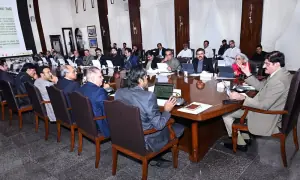Lahore High Court: Biological fathers must support children born out of rape or wedlock
3 min readThe Lahore High Court has ruled that the financial responsibility for children born out of rape or wedlock lies with the biological father.
The court stated that if a woman can establish the biological parentage of a child in court, the trial court must order the father to bear the child’s financial expenses.
Justice Ahmad Nadeem Arshad issued a 15-page written verdict in response to a petition filed by Muhammad Afzal. The court remanded the case concerning the maintenance of a five-year-old girl back to the trial court, directing it to reconsider its decision based on evidence.
The court ruled that if a woman proves that the petitioner is the biological father of the child, the trial court must assign financial responsibility accordingly. All parties have been instructed to appear before the trial court.
Also, read this
Suspect arrested in alleged gang-rape of MPhil student in Lahore
LHC pushes for urgent action from WASA on water meter issues
Justice Ahmad Nadeem Arshad emphasised that justice and fairness demand that if biological parentage is established, the father must bear the child’s expenses. The judge also noted that it is the biological father’s moral obligation to take responsibility for an illegitimate child.
Background of the case
According to court records, the petitioner allegedly raped a woman, Maryam, in 2020. A case was registered against him under rape charges, and as a result of the assault, the woman gave birth to a daughter.
She later filed a claim for the child’s financial support against the biological father.
In the trial court, the petitioner denied being the father and argued that he should not be held responsible for the child’s maintenance.
However, the trial court ruled in favor of the mother and ordered the petitioner to pay Rs3,000 per month as child support. The petitioner then challenged this decision in the Lahore High Court.
The Lahore High Court noted that this is not a simple case of child maintenance, as there is a significant difference between a “legitimate” child (born within a legal marriage) and a “biological” child (born outside wedlock).
Under Islamic law, courts have the authority to order interim maintenance for a legitimate child. However, when a woman claims maintenance for a biological child and the alleged father denies paternity, the legal process becomes more complex. The court ruled that proving the biological parentage of the child is the responsibility of the mother. Islamic law provides various methods to determine a child’s lineage. Before deciding on child support, it is crucial to first establish the child’s legal biological status. The court stated that assigning financial responsibility without confirming parentage would lack transparency.
Objections and references to Islamic law
During trial court proceedings, the petitioner’s lawyer challenged the court’s jurisdiction, arguing that the mother needed certification from the relevant authorities to prove the child’s paternity.
The petitioner maintained that he could not be held responsible for raising an illegitimate child.
The court’s verdict referenced holy Quranic verses, Hadiths, and prior Shariah court rulings. It also discussed legal frameworks, noting that the West Pakistan Family Courts Act of 1964 governs matters related to marriage and family disputes.
The court rejected the petitioner’s objection to family court jurisdiction, citing Section 488 of the Criminal Procedure Code (CrPC), which grants magistrates authority over family-related cases.
Additionally, the ruling pointed out that Bangladesh’s legal system recognises and grants rights to children born as a result of rape.
Ultimately, the Lahore High Court remanded the case to the trial court for further proceedings and a final decision based on evidence.
For the latest news, follow us on Twitter @Aaj_Urdu. We are also on Facebook, Instagram and YouTube.























Comments are closed on this story.